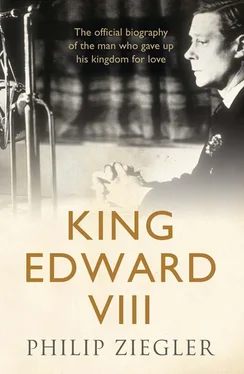If he had known her before 1913 he would have been too immature to pay her any serious attention. It is tempting to speculate, however, on what would have happened if Dudley Ward had died in battle and Freda, when he met her in 1918, had been not an estranged wife but a decorously merry widow. Could he and would he have married her, and if so, what difference would it have made?
The fact that she was a commoner would have created difficulties but would not have made the match impossible. As late as 1932 the Prince of Wales told his father that he had never realized he might be allowed to marry ‘a suitable well-born English girl’. No one had ever suggested the possibility to him before, he said, ‘There was only one lady he had ever wished to marry and that was Mrs Dudley Ward – and he would still like to marry her. But the King said he didn’t think that would do.’ 65The Prince’s ignorance is extraordinary; the matter had constantly been debated over the previous fifteen years. All the evidence suggests that if he did not know that he might be allowed to marry a British commoner it was because he had not asked. And if he did not ask, it was because he did not wish to know; he was determined not to marry anyone except Freda and preferred to keep in his mind this half-imaginary barrier in the way of matrimony. In fact as early as 1917 George V recorded that he had told the Privy Council his children would be allowed to marry into British families: ‘It was quite a historical occasion.’ 66The fact that Edward was Prince of Wales would have made the King more cautious about the suitability of any candidate, but nothing was said to indicate that the eldest son was to be treated differently from his siblings. The objection to Rosemary Leveson-Gower had been not that she was a commoner but that there was ‘a taint in the blood’. If the Prince did not know this then he wilfully blinded himself to reality.
A widowed Mrs Dudley Ward would certainly not have seemed suitable to the King and Queen. There would have been strong opposition, possibly too strong to overcome. For one thing the previous marriage, with the problems it would have posed, such as semi-royal stepchildren, would have been a serious obstacle. For another, a lace-manufacturer’s daughter, however respectable, would not have seemed the right sort of match for a British prince, let alone the heir to the throne. But beneath his testiness George V was a kindly and susceptible man, sincerely anxious that his son should find happiness and security. There was at least a chance that the obstinacy of the Prince and the charms of Mrs Dudley Ward would in the end have worn down his resistance. Queen Freda would have seemed a surprising concept to the British people, but so great was the popularity of the Prince of Wales in the years after the war that public opinion would undoubtedly have supported him. It could have happened.
It is also possible to argue that though it could , it would not have happened. The Prince, it has been said, loved Freda Dudley Ward just because she was inaccessible. If she had been free to marry him, he would not have wanted to marry her. Whether he was aware of it or not, the argument goes, he was resolved never to marry; by falling in love with a married woman he was providing himself with an alibi against having to marry anyone else. He was temperamentally unable to accept such a commitment, or perhaps he sought to leave open a route by which he might one day escape the throne.
It is impossible to prove the contrary; where motives are in question it must always be a matter for surmise. The theory, however, does not seem to be supported by what facts there are. He had once been anxious to marry Portia Cadogan; when the time came he was resolved to marry Mrs Simpson; everything he said or did indicated that he would have liked nothing better than to make Freda Dudley Ward his wife. Far from seeking to avoid commitments he sought them with relentless fervour. The lesson to be learnt from the last thirty-five years of his life is surely that, though he might not have been particularly happy as a married man, he was far unhappier as a bachelor.
And if he had been allowed to marry Freda Dudley Ward, or Portia Cadogan, or any other strong woman whom he could have loved; if, like his luckier brother, he had found his own version of Elizabeth Bowes Lyon; would it have made any difference? Might he have become, to use the simpliste but by no means valueless terminology of 1066 and All That , a ‘good king’? One has, of course, not the remotest idea. All that can be said with certainty is that in 1919 the potential was there: the charm, the good will, the enthusiasm, the readiness to learn, the enquiring mind. So too, of course, were the corroding weaknesses; but with the support and encouragement of the right wife the weaknesses might have been overcome and potential become reality. At the least, the reign of King Edward VIII would have taken a very different course.
DON’T THINK YOU CAN ACT LIKE OTHER PEOPLE, THE KING warned his son at the end of the war. ‘You must always remember your position and who you are.’ But, the Prince asked himself, ‘who exactly was I?’ 1He was a man apart, that much was clear, and he loathed it. He did what he could to mitigate his isolation, to treat others and to be treated himself as if he were a normal human being; but though a normal human being was what he was, he would never win acceptance of the fact. Even by those who knew him best he was treated with gingerly deference, as a freak with a touch of the divine, an improbably animated refugee from Madame Tussaud’s. His jokes would be greeted with sycophantic fervour by those who were amazed a prince could joke at all; his peccadilloes were met with extravagant censure by those who did not believe a prince should be vulnerable to the weaknesses of the flesh. Part at least of the sympathy he felt towards Americans came from his conviction – rarely justified – that they would not view him with the curious compound of reverence and resentment that the average Briton adopts towards its monarchy.
That veteran courtier Fritz Ponsonby placed all the Prince’s qualms firmly into focus when he remonstrated with him for making himself too accessible. ‘The Monarchy must always retain an element of mystery,’ he maintained. ‘A Prince should not show himself too much. The Monarchy must remain on a pedestal.’ The Prince flatly disagreed. The last place he wished to be was on a pedestal, he wanted to be down among the people, getting to know them and letting them know him. 2There was more truth in both points of view than either party was ready to concede. But the argument was anyway academic. Every time the Prince of Wales tried to descend from his pedestal the British people put him back again. Wherever he went, whatever he did, he was walled around by deferential affection, a barrier imperceptible sometimes but inexorably setting him apart. Even when he first went out with the Pytchley hunt, six stalwart followers were secretly deputed to escort him and to ensure that he returned unharmed. 3If he could not be treated as an equal on the hunting field, where a man is traditionally worth no more than his courage, his prowess as a rider and the quality of his horse, then where could he hope to find the sort of acceptance that he craved?
To be isolated was bad enough, to be isolated in inactivity was insupportable. The designated successor to the leadership of some great company or institution will be fully occupied with the specialist duties that fall to him while he is waiting to take over. The heir to some great estate, even in 1919, could busy himself in whatever career he chose until the title and the land became his. The Prince had no specialist duties, yet the tasks that were imposed upon him effectively prevented him pursuing any serious career. His life was divided between furious bouts of what he described as ‘princing’ – opening hospitals, addressing dinners, receiving addresses, smiling, smiling, smiling – and tracts of emptiness which it was up to him to fill as best he could. Geddes, the British Ambassador in Washington, suggested that the Prince would make an ideal Governor General of Canada. 4The King insisted that he was needed nearer home. The Queen said that he must ‘learn how to govern’. 5Yet little indeed was done to teach him. He was denied access to all but a limited range of state papers, never encouraged to talk to politicians or civil servants. He told Lady Airlie that he realized he must work to keep his job, but was given no work and was not even sure he had a job. 6
Читать дальше












